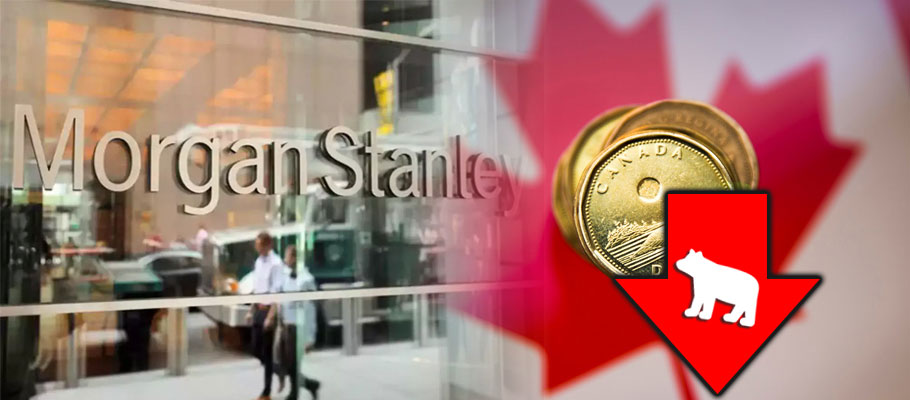
Published: May 14th, 2025
In a note to investors this week, Forex strategists at Morgan Stanley said the bank had turned CAD seller given a backdrop of trade uncertainty that will be an ongoing challenge for Loonie bulls.
‘The challenging global trade environment paired with downside growth risks from below the border bodes poorly for the Canadian Dollar,’ Morgan analysts wrote. ‘A US slowdown would have negative spillovers for the Canadian economy, exposing it in ways that other G10 economies won't experience.’
Tightly interlinked trade between the two countries becomes a risk rather than benefit in this scenario, according to Morgan Stanley. While American economic prints continue to point to robust growth in the face of elevated trade uncertainty, Morgan economists believe signs of a slowing economic pulse will soon appear.
Canada's economy depends on US imports and supply chains. Were trade relations between the two countries to sour further under Trump, any slowdown south of the border could weigh heavily on Canadian domestic growth prospects.
The potential for additional weakness in Canadian output will have central bankers in Ottawa watching for signals to cut interest rates again, which could undermine the Loonie's interest rate support.
‘Recent comment from the Bank of Canada (BoC) points to some members of the Governing Council favouring a cut at the next meeting rather than holding course,’ notes Morgan Stanley.
The BoC's last meeting summary in April suggested policy setters were watching for weakening business and consumer confidence data.
A February 2025 note to investors from Deutsche Bank predicted that the Canadian Dollar could test new all-time lows this year if the new Trump administration levied its proposed 25 percent import tariff on Canadian goods.
The pre-inauguration threat made by Trump via X and his own Truth Social network sent the Loonie hurtling Earthward. Canadian officials have responded angrily, with then Prime Minister Justin Trudeau saying that Canada would respond ‘dollar for dollar’ with retaliatory tariffs of its own.
Deutsche analysts wrote that the very real prospect of an escalating US-Canada trade war would be a ‘worst-case scenario’ for Canada's domestic economy and CAD.
‘Should American tariffs go ahead, it's natural to assume Ottawa will fight back with tariffs of its own, and in product categories similar to those targeted in the previous 2018 Trump tariff battle. What's different today is that the Canadian government has also mooted the idea of export taxes on commodities. In a trade battle with the US this could give Canada real leverage, despite its much smaller economy.’
Deutsche analysts believed the impact on Canadian aggregate demand would be ‘significant, probably damaging enough to push Canada into a recession.’
In that scenario the Bank of Canada would have to respond strongly, forcing central bank policymakers to cut rates more deeply and for longer than previously expected. The result could be a weakened Loonie.
Trump was and remains keen to make good on his threat. He repeatedly singled out Canada and Mexico on the campaign trail as priority targets for new tariffs. He argued that lax border enforcement by both countries has exacerbated illegal immigration to the US.
Canadian households and businesses will continue to tolerate a period of uncertainty, which could create headwinds that dampen economic growth.
Prior to Canada's expected Spring federal election, polls suggested the Liberal government of Justin Trudeau will fall to a populist-led conservative party.
Pierre Poilievre, head of Canada's conservative opposition party, had positioned himself in broad alignment with Trump and the MAGA movement south of the border – not least on the issues of cryptocurrencies.
Poilievre has branded himself as the pro-crypto candidate for Prime Minister, however it didn't help him beat Trudeau replacement Mark Carney, who went on to win the election, albeit by a narrow margin.
‘We need to let ordinary people take back control of their money. To do that in a time of expanding government oversight we need to make crypto fully legal and create conditions that will allow it to thrive,’ Poilievre said in a recent post on X. He pledged to help ordinary Canadians ‘take back control over the money you've earned through your hard work from politicians and bankers.’
He had also said that a vote for him will help make Canada ‘the blockchain capital of North America’.
Poiliviere's crypto plans were light on specifics. Just how he would make Canada a "blockchain capital" remains to be seen. For the time being, his objective is likely to tap the surge of interest in crypto amongst grassroots Conservative Party members.
After the ‘Freedom Convoy’ occupation of Ottawa, Canada's capital in 2024, crypto was seen as a way to get around state surveillance and offer financial support to convoy participants by right wing supporters of the protest.
As Canada’s National Post newspaper noted, Poiliviere had a long history of criticising Canada's central bank, blaming it for aggravating inflation and debasing the country's fiat currency (CAD), messages that resonate with libertarians and Bitcoin proponents across the conservative base.
Poiliviere's take on crypto differs sharply from Liberal government policy. The Trudeau government has took aggressive measures to reign-in the crypto industry in the wake of the 2022 Freedom Convoy protest, adding new reporting requirements for crypto transactions worth more than CAD 1,000.
Exactly how Poiliviere's Bitcoin rhetoric will play amongst voters over the next four years remains to be seen. Many Canadians see it as a partisan issue, making pro crypto messages less impactful.
Alternatively, an expanding base of tech workers, often assumed to be sympathetic to the libertarian ethos of Silicon Valley, might weigh in Poiliviere's favour. The country's crypto sector is booming in major centres like Toronto, which is also the hometown of Ethereum founder Vitalik Buterin.